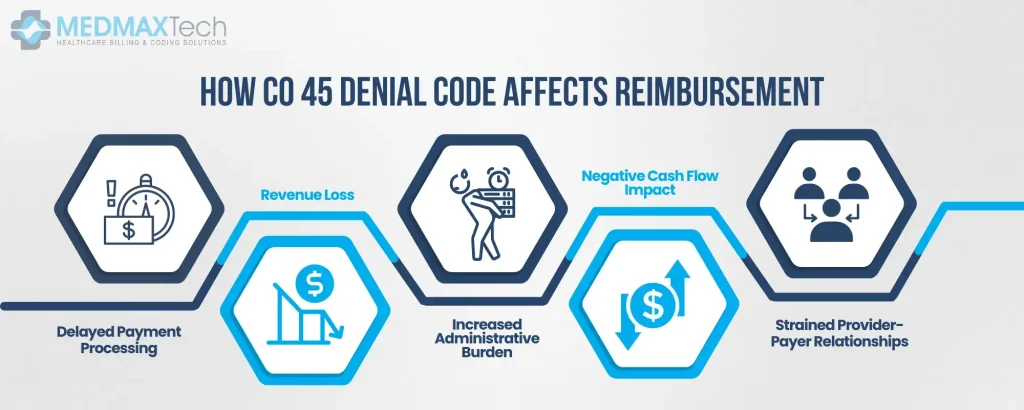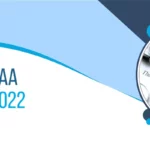
CO 45 Denial Code: A Providers’ Roadmap to Claim Approval
Ever wondered why some medical claims hit roadblocks on their way to approval and reimbursement? In the maze of medical billing and reimbursements, healthcare providers face a variety of denial codes, each signaling a hurdle in the journey to claim approval and reimbursement. Among these, CO 45 Denial Code holds significant importance, signaling potential hurdles in claim approval and reimbursement. Understanding the intricacies and implications of CO 45 Denial Code is paramount for providers aiming to streamline their revenue cycle management processes.
CO 45 Denial Code often serves as a red flag for areas requiring improvement in revenue cycle management practices. By comprehensively understanding the nuances of CO 45 Denial Code, providers can implement proactive measures to improve AR recovery rate and ensure timely reimbursement.
CO 45 Denial Code description, also referred to simply as “CO 45” or “45 code,” signifies specific reasons for claim denials encountered by healthcare providers. This denial code can result from various factors, ranging from errors in documentation to discrepancies in coding and billing practices. Providers need to delve deep into the intricacies of CO 45 Denial Code to identify root causes and implement effective strategies for mitigating denials and optimizing revenue streams.
CO 45 Denial Code Description
CO 45 Denial Code provides insight into its nature and implications for healthcare providers. CO 45 Denial Code description encompasses a range of scenarios, including incomplete or inaccurate information provided on claims, missing documentation, or failure to meet payer-specific requirements. Providers encountering CO 45 denials must understand the specific circumstances leading to these denials to take appropriate corrective actions.
Decoding CO 45 Denial Code in Detail
Let’s break down what is CO 45 Denial Code. When you see CO 45 denial code on your medical bill or claim, it’s like a signal that something might be wrong with it. CO 45 denial code basically tells you that the insurance company or payer couldn’t approve your claim because of some issue they found. It’s like a code they use to communicate what went wrong.
Common Scenarios Triggering CO 45 Denial Code
- Missing or incomplete information on the claim form.
- Incorrect or mismatched codes used for procedures or diagnoses.
- Lack of supporting documentation for the services billed.
- Failure to meet specific requirements or guidelines set by the insurance company or payer.
- Billing for services that are not covered under the patient’s insurance plan.
- Submission of duplicate claims for the same service.
How CO 45 Denial Code Affects Reimbursement

I. Delayed Payment Processing
CO 45 Denial Code often leads to delays in processing payments for healthcare providers. When a claim is denied with CO 45, it means the insurance company or payer couldn’t approve it for reimbursement. As a result, providers may experience delays in receiving payment for the services rendered, affecting their cash flow and financial stability.
II. Revenue Loss
CO 45 Denial Code directly impacts providers’ revenue streams by resulting in lost or delayed payments. When claims are denied with CO 45, providers may not receive reimbursement for the services they provided to patients. This revenue loss can have significant financial implications for healthcare organizations, affecting their ability to cover operating costs and deliver quality care.
III. Increased Administrative Burden
Dealing with CO 45 Denial Code adds to the administrative burden on healthcare providers. Providers must invest additional time and resources in correcting errors, resubmitting claims, and navigating the appeals process. This increased administrative workload detracts from patient care activities and adds operational costs to healthcare organizations.
IV. Negative Cash Flow Impact
CO 45 Denials can result in negative cash flow impact for healthcare providers. With delayed or lost payments due to claim denials, providers may struggle to meet financial obligations such as payroll, supplies, and overhead expenses. Negative cash flow can hinder the ability of healthcare organizations to invest in infrastructure improvements and expansion initiatives.
V. Strained Provider-Payer Relationships
CO 45 Denial Code can strain relationships between providers and payers. When claims are denied frequently with CO 45, it can lead to frustration and dissatisfaction on both sides. Providers may feel unfairly treated or unsupported by payers, while payers may perceive providers as lacking in compliance or documentation standards. Effective communication and collaboration are essential to address issues related to CO 45 Denial Code and maintain positive provider-payer relationships.
Factors Leading to CO 45 Denial
CO 45 Denial Code can occur due to various factors related to claim submission, documentation, and compliance. Here are detailed descriptions of some common factors leading to 45 CO Denial:

Incomplete or Inaccurate Information: One of the primary reasons for CO 45 Denial Code is due to incomplete or inaccurate information submitted on the claim form. This can include missing patient demographics, incorrect procedure or diagnosis codes, or incomplete documentation of services provided.
Non-Compliance with Payer Guidelines: 45 CO Denial Code may occur when providers fail to comply with specific guidelines set by the insurance company or payer. This could involve not following proper billing procedures, submitting claims after the specified deadline, or billing for services that are not covered under the patient’s insurance plan.
Coding Errors: Incorrect coding of procedures or diagnoses is a common factor leading to CO 45 Denial. This includes using outdated or invalid codes, assigning codes that do not accurately reflect the services provided, or using codes that are not recognized by the payer.
Lack of Prior Authorization: Services requiring prior authorization or pre-approval from the insurance company may result in CO 45 Denial if the necessary authorization was not obtained before rendering the services. Failure to follow the payer’s authorization requirements can lead to claim denials.
Duplicate Claims: Submitting duplicate claims for the same services can trigger CO 45 Denial. Providers should ensure they are not inadvertently resubmitting claims that have already been processed or paid by the payer, as this can result in denials and unnecessary administrative burden.
Billing for Non-Covered Services: Billing for services that are not covered under the patient’s insurance plan can result in 45 Code. Providers should verify coverage and benefits for each patient before rendering services to avoid denials related to non-covered services.
Real-Time Examples of CO 45 Denial
Example 1
Incomplete Documentation: A healthcare provider submits a claim for a patient’s recent surgery but forgets to include crucial medical records, such as pre-operative assessments or post-operative notes. As a result, the claim is denied with CO 45 Denial Code because the documentation does not fully support the billed services.
Example 2
Missing Prior Authorization: A patient undergoes a specialized imaging procedure without obtaining prior authorization from their insurance company. When the provider submits the claim, it is denied with CO 45 Denial Code because the necessary authorization was not obtained before the service was performed.
Example 3
Non-Covered Service: A patient receives a cosmetic procedure that is explicitly excluded from coverage under their insurance plan. Despite this, the provider submits a claim for reimbursement, which is subsequently denied with CO 45 Denial Code due to the nature of the service being non-covered.
Tips for Accurate Documentation to Avoid CO 45 Denial

Reduce your claims denial rate with the following tips:
- Ensure all patient information is complete and up-to-date on claim forms.
- Use correct and specific procedure and diagnosis codes according to coding guidelines.
- Include detailed descriptions of services provided and their medical necessity.
- Attach any required supporting documentation, such as medical records or authorization forms.
- Double-check for errors or omissions before submitting claims.
- Verify eligibility and coverage details for the patient’s insurance plan.
- Document any prior authorization or referrals obtained for services.
- Follow payer-specific guidelines for documentation requirements.
- Maintain consistency in documentation across all claims and patient records.
- Keep abreast of updates and changes in coding and billing regulations to ensure compliance.
Final Words
Effectively managing CO 45 Denial Code is integral to the success of healthcare providers in maximizing revenue and maintaining financial stability. By partnering with a reputable medical billing company like Medmax Technologies, providers can access expert support and specialized solutions tailored to address the complexities of claims processing and denial management.
Medmax Technologies offers comprehensive revenue cycle management services, including proactive measures to prevent CO 45 Denials, meticulous documentation practices, and efficient communication with payers. Leveraging advanced technology and data analytics, Medmax Technologies empowers providers to identify trends, implement targeted interventions, and optimize reimbursement outcomes.
Through collaboration with Medmax Technologies, providers can navigate the challenges associated with CO 45 Denials with confidence, knowing they have a dedicated partner committed to their financial success and operational excellence. Together, providers and Medmax Technologies can streamline revenue cycle operations, improve claim approval rates, and ultimately enhance the delivery of patient care.









